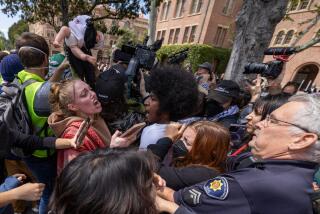Gold medals, iron fists
- Share via
There is something bizarre yet familiar about the fact that China’s crackdown in Tibet has provoked more discussions on the fate of the Beijing Summer Olympics than on Tibet itself. The Games are supposed to be China’s coming-out party as a 21st century economic superpower. The brutality of the clampdown on the Tibetan protesters puts this at risk.
Countries seeking a piece of China’s economy have rushed to de-link the crackdown in Tibet with the Olympics. Last week, the White House headed off any talk that President Bush would cancel his appearance at the Olympic Games when spokeswoman Dana Perino said Bush believed that the Olympics “should be about the athletes and not necessarily about politics.” Earlier, the European Union said an Olympics “boycott would not be the appropriate way to address the work for respect of human rights, which means the ethnic and religious rights of the Tibetans.”
What Bush and the EU apparently don’t realize is that the crackdown is not happening in spite of the Beijing Olympics but because of the Beijing Olympics. In acting so brazenly in Tibet, China reminds us that pre-Olympic repression is as time-honored as the lighting of the Olympic torch. Consider:
* In 1984, Los Angeles Police Chief Daryl F. Gates oversaw the jailing of thousands of the city’s gang members, known and suspected, in the infamous “Olympic gang sweeps.”
* The 1996 Atlanta Games were supposed to reveal the face of what President Clinton called “the New South.” But the new version ended up looking a lot like the old one when city officials razed public housing where many African Americans lived to make way for Olympic facilities and ordered mass arrests to clear the streets of what they considered riff-raff. As Wendy Pedersen, a low-income housing organizer in Vancouver, Canada, site of the 2010 Winter Olympics, said last year, Atlanta passed six ordinances that “made all kinds of things illegal, including lying down” on city streets. Lots of the people were put in a jail that the Olympic planning committee built, the first project completed on schedule, according to Pedersen.
* Repression followed the Olympic Rings to Greece in 2004. As “Democracy Now,” a daily, independent news show that airs on public radio stations across the U.S., reported at the time, authorities in Athens “round[ed] up homeless people, drug addicts and the mentally ill, requiring that psychiatric hospitals lock them up.” The pre-Olympics “cleanup” included detaining or deporting refugees and asylum-seekers. Being the first Olympics after 9/11, police surveillance of immigrant Muslims and makeshift mosques in Athens greatly increased.
* The most brutal example of Olympics-related repression came in Mexico City in 1968. The capital city had been the scene of months of university students striking and protesting for greater rights for themselves and workers. As the date of the Games approached, the Mexican government increasingly took a hard line. On Oct. 2, 10 days before the opening of the Summer Olympics, Mexican security forces fired on thousands of student demonstrators and workers gathered in the Plaza de las Tres Culturas, killing hundreds of them. Kate Doyle, director of the Mexico Documentation Project, an organization seeking to shed light on the lethal crackdown, wrote in the group’s 2006 report that “when the shooting stopped, hundreds of people lay dead or wounded, as army and police forces seized surviving protesters and dragged them away.”
As shocking as the Tlatelolco massacre, as it came to be known, was the coverup. “Eyewitnesses to the killings,” reported Doyle, “pointed to the [Mexican] president’s ‘security’ forces, who entered the plaza bristling with weapons and backed by armored vehicles. But the government pointed back, claiming that extremists and communist agitators had initiated the violence.” Mexican authorities also spoke of “making their country secure” for the Games.
China’s aim in Tibet in 2008 may be the same as Mexico’s in 1968 -- a preemptive strike to ensure that the Beijing Games do not become a platform for protesting the Chinese government.
The irony then was that although the Mexican government succeeded in crushing any sign of protest outside the Olympic venues, it couldn’t stop American Olympic athletes Tommie Smith and John Carlos from raising their black-gloved fists to protest racism and the muzzling of dissent, defining the 1968 Games as a stage for discontent rather than athletic excellence.
It’s a lesson that the Chinese may want to consider now.
More to Read
Go beyond the scoreboard
Get the latest on L.A.'s teams in the daily Sports Report newsletter.
You may occasionally receive promotional content from the Los Angeles Times.






